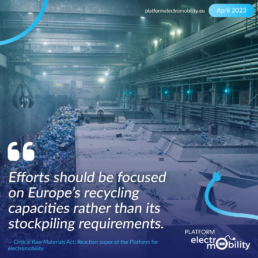Critical Raw Materials Act: Reaction paper of the Platform for electromobility
Critical Raw Materials Act :
Reaction paper of the Platform for electromobility
The European Commission’s proposed Critical Raw Materials Act is a much-needed initiative in today’s world. Demand for critical raw materials (CRMs) will continue to increase, in order to underpin a sustainable transport system in the near future. Indeed, the proposed Act aims to ensure the sustainable supply of those CRMs essential for electric mobility-enabling sectors, electric cars themselves and renewable energy technologies. We particularly welcome the Act’s efforts to balance resilience, security of supply and environmental protection with the new focus on refining and remining, which are crucial steps in producing and securing CRMs. ‘Refining’ refers to the process of purifying raw materials, which can reduce the waste and environmental impact of their extraction. ‘Remining’, meanwhile, involves the extraction of raw materials from the waste or by-products generated during the production process or from legacy mining sites.
Furthermore, the Act also stresses the importance of the responsible extraction and processing of CRMs. This includes promoting the use of new and innovative technologies for reducing the environmental impact of extraction and processing activities. By adopting these measures, the European Union (EU) can lead the way in sustainable mining practices, while also ensuring the ongoing availability of critical raw materials for the production of high-tech products. These measures will also help reduce the dependency of the EU on raw materials sourced from outside its borders, thereby ensuring a stable, sustainable and secure supply of these much-needed CRMs.
For these reasons, the CRMs Act proposed by the European Commission is a generally welcome initiative, one which can help ensure the sustainable supply of critical raw materials. However, the following addition improvements, proposed by all members of the Platform for electromobility, from NGOs to industries, should be considered by co-legislators:
While the Hydrogen bank is properly linked to an innovation fund, the Commission’s proposal fails to link a clear funding mechanism to the investment activities needed to reach objectives. This is particularly salient for the national mapping and mining prospective activities required to reach the 10% extraction objectives. Funds should be designed to ensure full respect of social and environmental due diligence for new and remining plants.

We call for an extremely cautious assessment of the need for stockpiling mechanisms, as they may have unintended negative consequences for the market and for emerging European industries. A robust and exhaustive analysis of the potential effects is essential before putting into place any measures to address short-term supply disruptions.
Thanks to the high recyclability potential of CRMs, the materials notably included in the clean transport can be considered in the long term as a future stock available for European use and consumption. In other words, the rolling stock of CRMs present in Europe’s electric fleet can be considered as the strategic stock Europe needs. Therefore, efforts should be focused on Europe’s recycling capacities rather than its stockpiling requirements. For this reason, the revision of the Industrial Emissions Directive or the REACH regulations should not undermine the competitiveness of recycling in EU, and should also ensure that equivalent conditions for recycling outside of EU are applicable.

On battery recycling shipment, p.18 of the accompanying ‘Communication’ currently proposes – for 2024 – the inclusion of waste codes for lithium-ion batteries and intermediate waste streams (‘black mass’) under the European List of Waste, in order to ensure their proper recycling within the EU.
We therefore propose to insert this new paragraph:
“The Commission shall adopt a Delegated Act specifying waste codes for lithium-ion batteries and intermediate waste streams (‘black mass’) and setting up a fast-track procedure for their shipment for recycling within the Union.”
The existing barriers to the shipment of end-of-life lithium-ion batteries across EU borders are significant and need to be urgently addressed. The EU therefore needs to clarify the waste classification of spent lithium-ion batteries and give them their own dedicated waste code so that all countries apply the same rules when ruling on their intra-EU shipment. The EU also needs to design a fast-track validation procedure for intra-EU shipment of both lithium-ion batteries and battery materials.
The legislative framework should also be adapted, such as the Waste Management Directive, to keep the results of shredding in Europe and support the development of materials and batteries collection. It is also crucial to facilitate transboundary waste streams such as waste batteries/black-mass, materials scraps (such as aluminium, copper, steel, plastics, rare earths, catalytic converters and electronic components), between EU Member States. This will encourage their recycling within the EU, while better controlling their exports to non-EU countries, thus ensuring the development of a common EU market for CRM rich feedstocks. For example, the inclusion of waste codes for lithium-ion batteries and intermediate waste streams (‘black mass’) under the European List of Waste is a one way to ensure their proper recycling within the EU (as mentioned in the CRM Communication).
It should be clarified as to how the results of the national exploration plans will be made publicly accessible. As a general rule, that which is publicly funded should be publicly accessible.
Concerns can be raised as to the degree of leniency provided to strategic projects by the proposal on their level of respect for the corporate sustainability due diligence requirements. It is important to stress that however strategic a project may be, those requirements must always be respected to ensure a fair and sustainable transition to clean mobility.
In parallel, we would like to question the Act’s requirement for mandatory resilience checks on large entreprises. A number of ongoing legislative proposals (e.g Corporate Sustainability Due Diligence) are already proposing new reporting requirements on European businesses: the issue of additional requirements due to resilience considerations should not be addressed separately but rather in the scope of these instruments.

Similarly, we wish to raise concerns over lack of detail given by the proposal on the proper consideration and calculation of the environmental footprint of CRMs in final products. The PEF (Product Environmental Footprint) is an LCA-based (life cycle analysis) method, developed by the EU Commission. However, other standards for LCA methods exist that also provide environmental impact calculations. This needs to be clarified and should also include a fixed timeline for when the European Commission should propose the relevant Delegated Act.
The CRM Act is part of a broader legislative framework for creating the conditions for a fair, sustainable and competitive transition to clean industries and zero-emission mobility. We invite co-legislators to work closely and in parallel on the Net Zero Industry Act (NZIA) and consider the recently adopted Renewable Energy Directive (RED) and Battery Regulation when amending the CRM Act. They should also be cautious about any increased administrative burden that the new requirements may create. In particular, we call for the alignment of impact assessment processes and authorisations measures, with emergencies measures for renewable energy as defined in in the RED.
The Platform welcomes the proposal to create a European Critical Raw Materials Board to oversee the governance and implementation of the CRM Act. However, it is once again vital for ensuring the sustainability and durability of the clean transition that industry, civil society and NGOs are adequately represented on this board.
Efforts must be made, in the context of the 2023 EU Year of Skills, to increase the coverage of CRMs in University Master programmes and to raise awareness around the issue in our next generation workforce. Skills shortages are particularly acute for geology and low-environmental-impact mining specialties, which are currently only present in regions with active mining industries.
Ad hoc incentives would help develop local and more-sustainable supply chains. Policy actions should be defined carefully, and should assess worthy examples adopted by other countries such as tax incentives and innovation funding. Such an approach would also create new jobs at local level and mitigate potential social impacts relating to the energy transition.
Additionally, skills-based visa schemes for raw material professionals currently based in third countries may help fill existing human capital shortages in the short term.
ERMA will play a key role in ensuring a successful approach to critical raw materials, but needs to be further empowered both in governance and financial terms. It requires a mandate to ensure the achievement of European Strategy targets, leading all European Union initiatives on raw materials endowed with all the necessary levers. The current Alliance mechanism for involving players along the value chain should remain; however, as the investment needed will be relevant, it will also be important to support those initiatives that achieve the critical mass to become game changers. Here, it is fundamental that ERMA should have a full overview of the levers that EU is putting in place (regulatory, financial, etc) and that it should be a driving force in implementing the strategy. All raw materials-related initiatives should fall within the overall ERMA framework.
In coordination with ERMA, each Member State should create a National Raw Material Agency (NRMAg) aimed at leading and implementing the national strategy. The structure, tasks and resources of NRMAg should comply with minimum framework requirements as defined at European level.
Conclusion
The CRM Act proposed by the European Commission is a much-needed step in securing the supply of raw materials essential to the EU’s economic and strategic interests. The Act acknowledges the increasing demand for critical raw materials, as well as their limited availability, and aims to establish a comprehensive framework for ensuring their sustainable and responsible sourcing.
However, there are some concerns and reservations that need to be addressed to ensure that the Act is fully effective. First, it must balance the need to secure critical raw materials against environmental and social sustainability, as well taking account of ethical considerations. In addition, it is essential to ensure that the implementation of the Act does not lead to trade barriers or lead to unfair competition that could ultimately harm the EU’s industrial competitiveness.
Careful consideration and monitoring are needed to ensure that the implementation of the CRM Act is effective, sustainable and equitable. By addressing these concerns and reservations, the EU can pave the way for a more resilient and sustainable supply chain for critical raw materials, while upholding its values and commitments.
